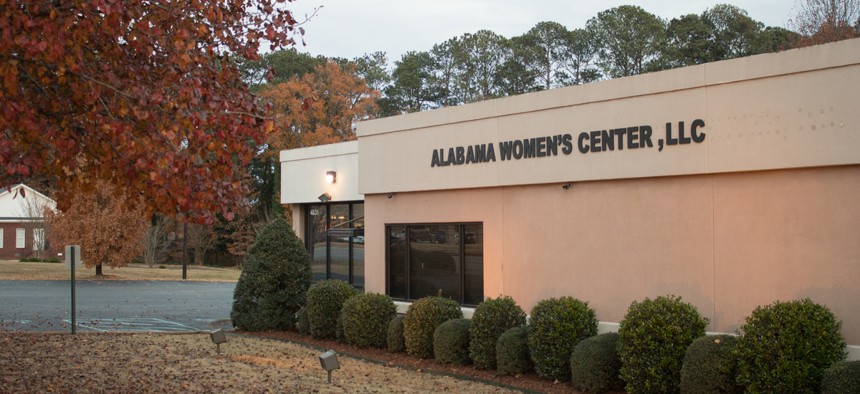Alabama House Passes Bill to Criminalize Most Abortions

An abortion clinic in Huntsville, AL, one of three in the state. Stan Reese/Shutterstock
STATE AND LOCAL ROUNDUP | State considers no money for jails in Michigan counties that don’t cooperate with ICE … Residents in L.A. take on a greater role in police misconduct cases … Food insecurity impacts every county in the U.S.
The Alabama House passed a bill that would make it a criminal offense to perform almost all abortions. The measure would not penalize the person receiving the abortion, but would effectively outlaw the practice in Alabama by imposing prison sentences of up to 99 years for doctors who perform the procedure. State Rep. Terri Collins, a Republican, brought the bill, and fought amendments proposing exceptions for rape or incest or funding a legal defense for the bill in court, which is estimated to cost $1 to $2 million. This year, many states have passed different measures restricting abortion, but this proposal is the strictest. The only exceptions where abortion would be allowed is to protect the life of the mother or a “lethal anomaly” with the fetus. “It’s time for the state of Alabama to lead for once. Let’s lead and do the right thing,” said Rep. Rich Wingo, a Republican from Tuscaloosa. But House Minority leader Anthony Daniels bemoaned the rejection of amendments to add rape and incest exceptions. "What does that say to the women in the state and the mothers in the state and the grandmothers in the state," he said. Most House Democrats walked out in protest, leading the bill to pass 74 to 3. Collins is now meeting with the Alabama Senate Republican Caucus, and is hopeful the measure will pass without amendments there as well. In November of last year, Alabama voters approved a constitutional amendment stating that there is no legal right to abortion in the state. The ACLU of Alabama has promised to fight the bill if it passes, as they did in 2016 over a similar bill, which was found unconstitutional. [Alabama Political Reporter; Montgomery Advertiser; CBS News]
SANCTUARY CITIES | Michigan lawmakers are considering a measure that would withhold state jail funding from local governments that don’t fully cooperate with federal immigration enforcement. Pushed by Senate Republicans, the financial penalty proposal passed out of the appropriations committee. State Senator Tom Barrett, who heads the subcommittee dealing with the corrections budget, said county sheriffs should cooperate with Immigration and Customs Enforcement. “I think this is good to require, good to maintain, and I think it should be expected of all of our law enforcement that they work in a cooperative and collaborative fashion,” he said. The bill now heads to the full Senate, but is facing strong opposition from the Michigan Department of Corrections, which fears that the requirement could affect cases that have nothing to do with immigration. “This will lead to more people being sent to prison, who otherwise could have served time in their county jail, been closer to their community and not have to carry the stigma of having served time in prison,” a spokesman for the DOC said. The measure is seen by some as a rebuke to Kent County, which in January announced that they would only hold detainees for ICE if a federal warrant has been issued. [The Detroit News; Bridge Magazine]
POLICE MISCONDUCT | Civilians in Los Angeles could now play a greater role in police misconduct discipline, thanks to a measure approved by the city council. Officers will have the option to have their cases heard by the traditional panel of two Los Angeles Police Department staff members and one civilian, or be considered by an all-civilian panel, a move that has caused controversy. The civilian panel concept was pushed in part by the Los Angeles Police Protective League, an officer union, which argues that LAPD officers on panels too often follow the will of the police chief and will rubber stamp those punishment recommendations. Some police reform advocates say that the panels won’t represent the diversity of the city, such as by not including people with criminal records. LA Mayor Eric Garcetti championed the measure, and is supportive of the outreach measures that will now recruit potential civilians from across the city. [LA Times; NBC Los Angeles]
FOOD INSECURITY | A new study shows that all counties in the U.S. contain people who cannot afford to buy food. The rate of food insecurity ranges from 3% in a county in North Dakota, or 36% in a county in Mississippi. The report also found that children are more likely to be food insecure than the rest of the population. Last week, the California Senate passed a bill that would set aside money for low-income college students who are food insecure. [USA TODAY; CBS News]
BLACK COWBOYS | A South Carolina festival is shedding light on the history of black cowboys, who are often left out of depictions of the West. The festival includes USDA workshops and seminars, historical demonstrations, and cowboy competitions on horses. In its 22nd year, the festival has become a gathering place for black cowboys from across the country. The tradition of the black cowboy has seen a resurgence lately, partly due to rapper Lis Nas X’s collaboration with Billy Ray Cyrus on the country hit “Old Town Road.” [Charlotte Observer; The Sumter Item]
Emma Coleman is the assistant editor at Route Fifty.
NEXT STORY: U.S. House Bill Calls for New Limits on Chemicals in Drinking Water






